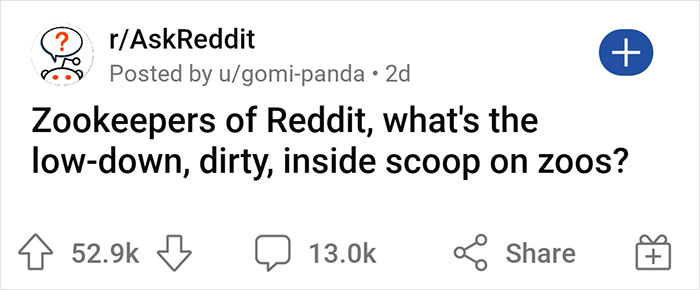Cruel or kind? The zoos around the globe have been sparking a debate on whether the age of keeping and celebrating animals in captivity is over, and if we’re ready to move forward. And even if we are, then freeing the animals in captivity poses yet another challenge for scientists and entire populations alike. What are the best ways to do that and are we even capable of ensuring their safety out there?
Having said that, around 1 million vertebrate animals live in captivity worldwide, making up over 10,000 zoos across the globe. They accumulate more than 600 million visitors annually, so you can imagine what a powerful business it really is. But while people get to see its fun and exotic facade, many not-so-nice things remain behind closed doors.
Recently, some zookeepers have come forward on Reddit to share “the low-down, dirty, inside scoop on zoos.” With 53k upvotes, the thread went viral, amassing some seriously cruel and very unsettling stories about animals behind the fence.
#1
I worked at a zoo in a northern country (can't say which as it'll give it away) which had a white tiger, and was quite famous for it. One day the zoo announced the tiger had died of 'natural causes'. Whilst working there a few years after he died, I was told by a keeper that there was actually a problem with the electric fencing in his enclosure that the zoo managers refused to pay to get fixed, thinking it would be fine.He was electrocuted to death a few weeks after they found the problem.
They covered the whole thing up by saying they weren't sure how he died, but that he was old. It's still a zoo secret to this day.
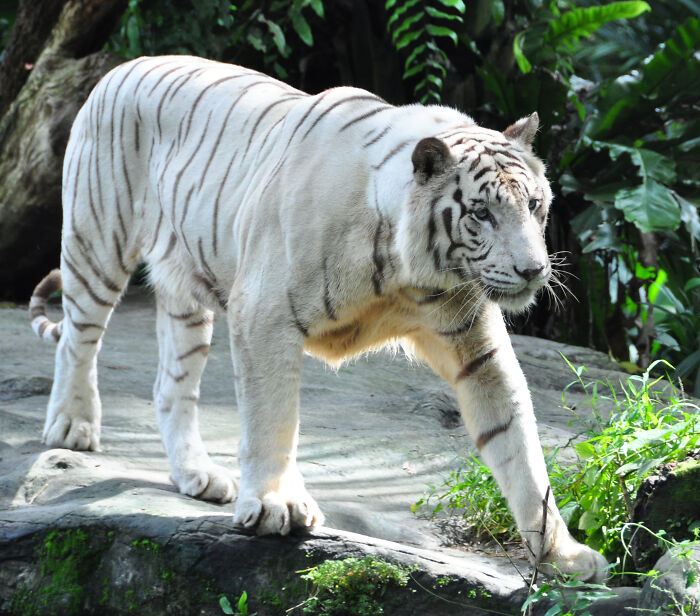
Image credits: magneticpowder
#2
If any animal escapes before the zoo opens to the public, the zoo is supposed to shut down completely for the day. Often, though, smaller zoos can’t afford to lose a day open to the public, so if some specific types of animals escape (such as reptiles or small animals), they will just stay open while having keepers look for the animal. ... I remember hearing from coworkers that they listened to our boss and opened even though a small but somewhat venomous snake was on the loose.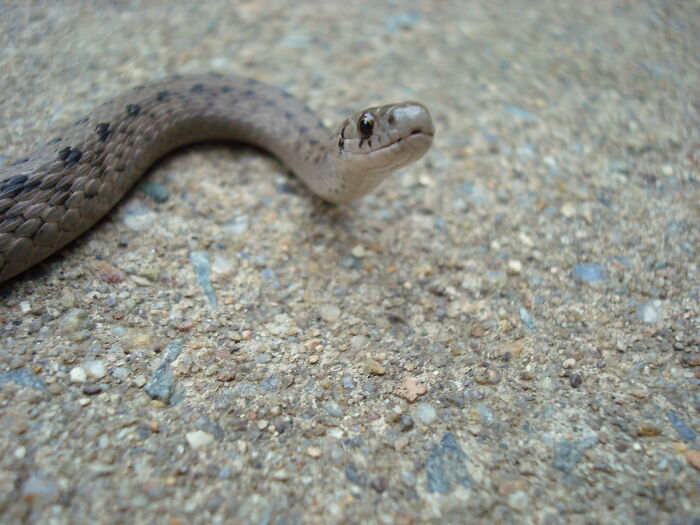
Image credits: OverdueFetus
#3
The zebras are ruthless and will tear apart any unfortunate kangaroo that dares break into an enclosure. They love the thrill of the chase...and the subsequent kill when they get bored.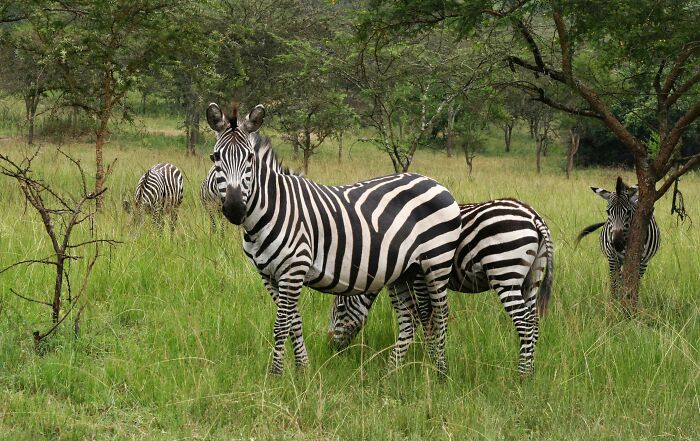
Image credits: NutkaseCreate
#4
The most dangerous and feared animal in case of an escape is not, as you may think, lions, tigers, or other large carnivores. It's the chimps. Those things will rip your arm off and beat you to death with the bloody end as soon as they look at you.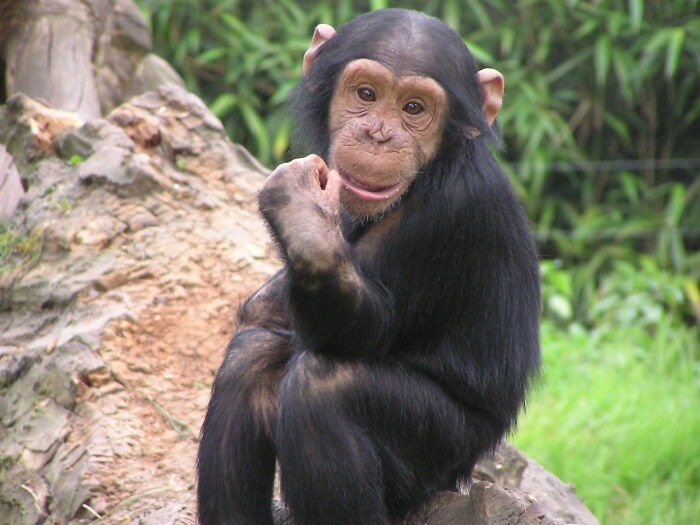
Image credits: ShadyElmm
#5
We closed the baboon exhibit because a baboon had a still birth and the troupe was "grieving".In reality they were throwing parts of the infant corpse around and there was nothing we could do about it
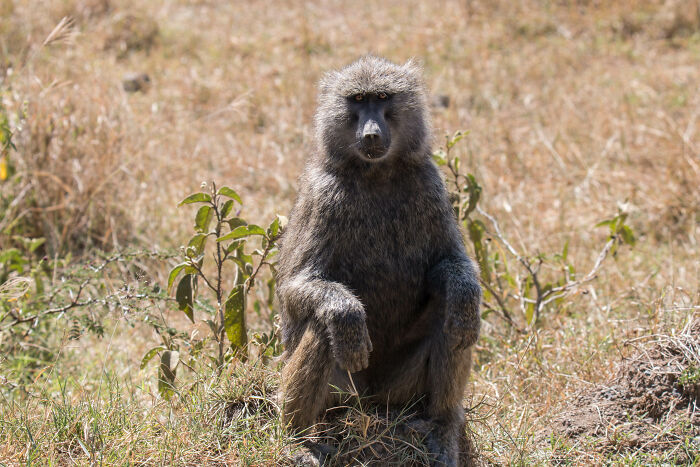
Image credits: randomiser5000
#6
Dead zoo animals are sometimes fed to carnivores.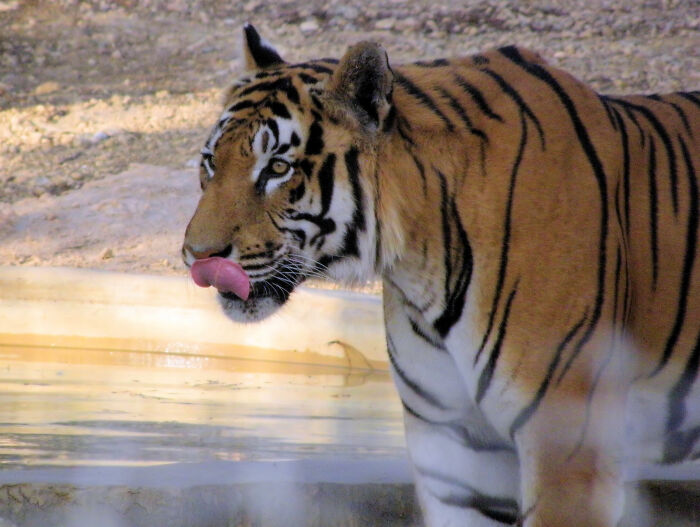
Image credits: KToTheA-
#7
Our lions will urinate on guests if they get too close, which is always funny to see. Not so funny to smell.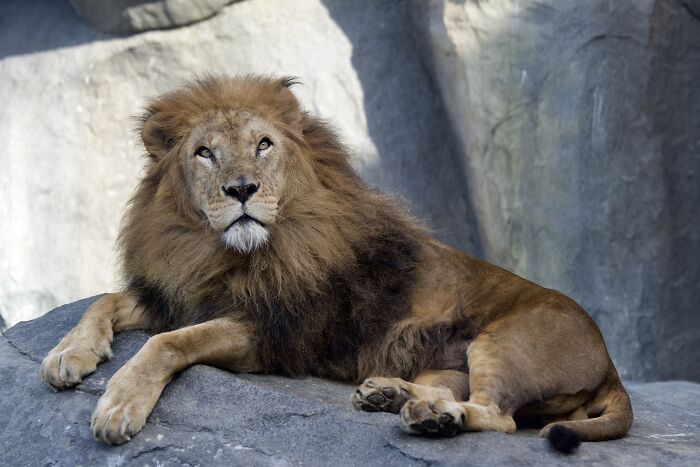
Image credits: epshuche
#8
One of our most popular exhibits was this incubator with baby chicks. We were told to tell visitors that the older baby chicks would be sent to schools as classroom pets or to the petting zoo. In reality, we did send the chicks to the zoo...as live animal feed for the snakes and other carnivores.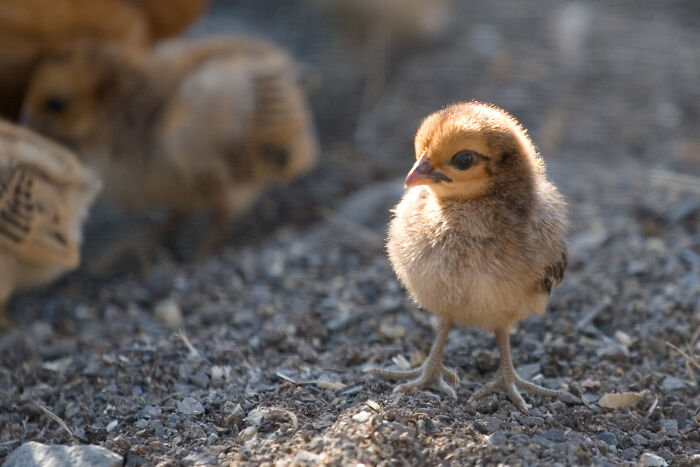
Image credits: dyslexic_draws
#9
When you're cleaning underneath the perches, parrots will wait for you to look up before [pooping]. They have good aim. That's how you get [poop] in the mouth. Don't look up.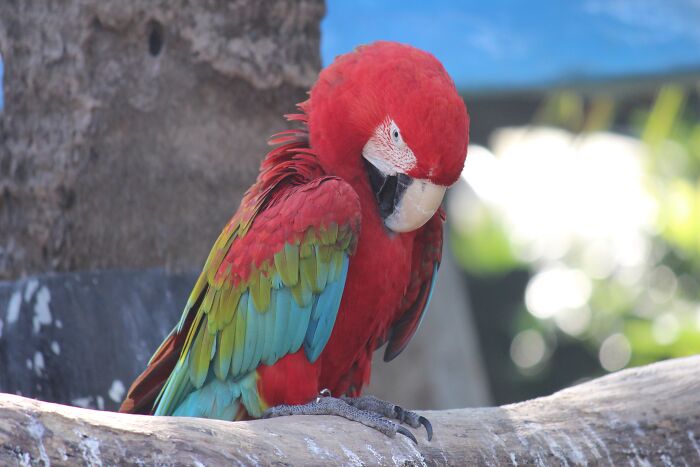
Image credits: BiteyParrots
#10
There was one particularly traumatic event with the lions on a very warm and very packed spring day. The zoo was inside a large park, so various wild animals wandered through the zoo all day. One unfortunate day, a large deer fell into the lion enclosure. The adolescent male stalked it and ran it down within about 30 seconds and tore the deer to shreds. In front of dozens of horrified adults and screaming kids. I felt kind of bad that so many people saw, but like, circle of life.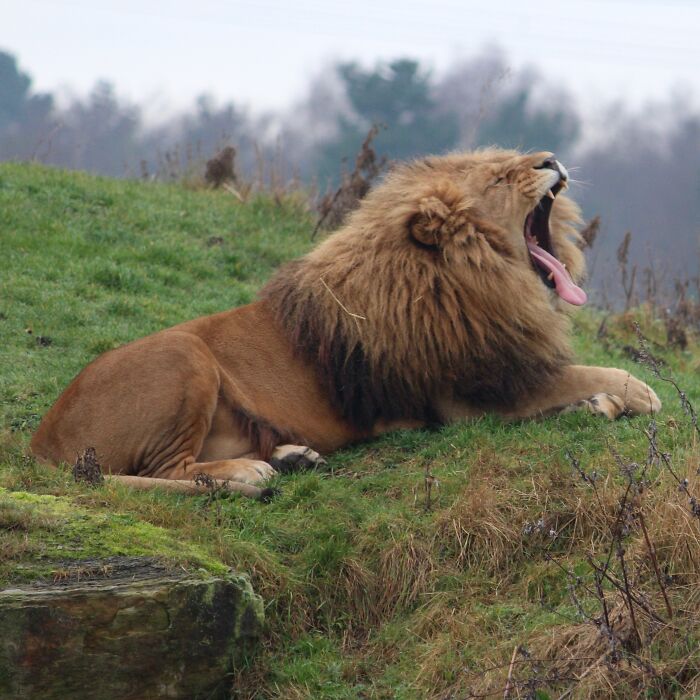
Image credits: ballerina22
#11
I worked with large tortoises. We had these five-gallon buckets for cleaning the poop out of enclosures, and other buckets for feeding them fresh grass we cut. The first day on the job, I took both buckets into the pen. ... I heard this awful, loud grunting and something breaking. One of the 300-pound males tried to bang the bucket in front of visitors and flattened it. He would even follow me around just in case I might leave more innocent buckets unattended.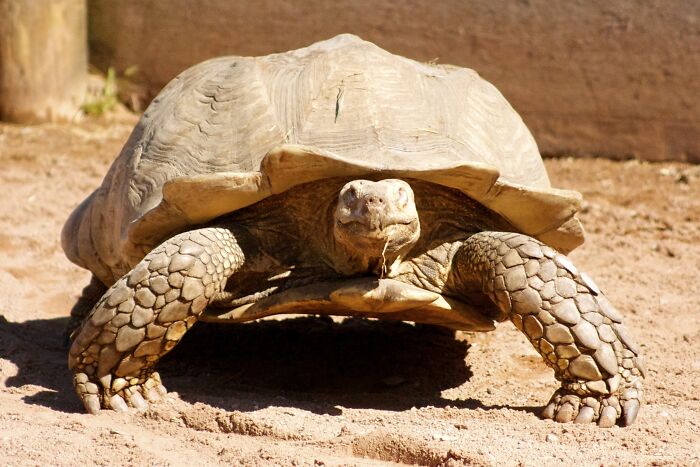
Image credits: DrTeethDDS
#12
Those free-roaming peacocks are really stupid and sometimes go in the lions exhibit and get torn up.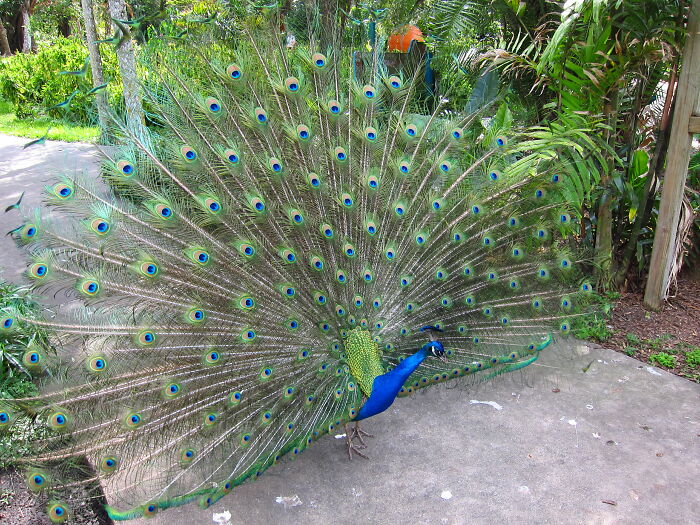
Image credits: MapleTopLibrary
#13
My wife was a zookeeper and I used to volunteer there a lot.Most of zookeeping is just picking up poop and making/delivering food.
The animal that was was least scary was a cheetah. They were pretty cool ignoring everything as long as they had food. The most scary to me were the giraffes. Back then you went into the enclosure with them and they'd sometimes swing their heads around and try to hit you just to be pricks. You had to be careful.
The job would actually be fantastic if they didn't let people into the zoo
#14
Fun fact bout the local zoo i learnt when i worked maintenance, there is a wolf enclosure. There is info bout the wolves, its maintained. "They are just shy/in their shelter atm" . There are no wolves, never was.#15
When I worked on the grounds crew at a zoo, there was a camel who thought it was hysterical to nudge people into the electric fence. When we would trim the moat around his enclosure, he liked to reach his neck out and hook you just hard enough to stumble and get yourself shocked.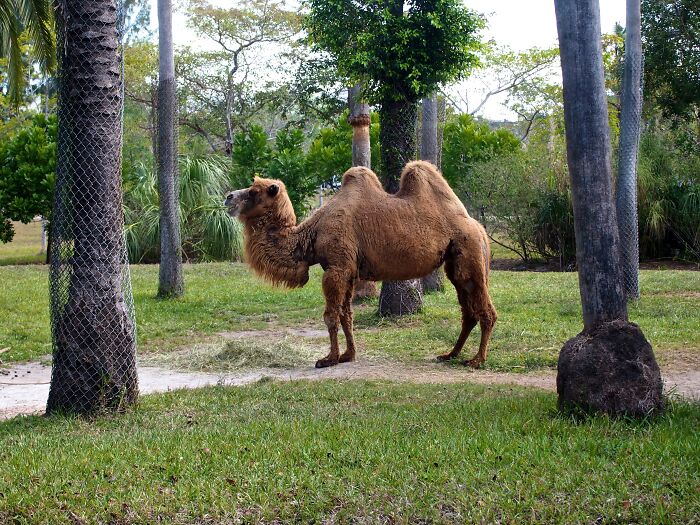
Image credits: amattwithnousername
#16
Next time you go to the zoo, ask someone which animals are 'kill on sight' in an escape. The answers will surprise you. Lions and tigers are typically on the 'tranq and capture' list, but a jaguar the size of a golden retriever is 'KoS.' The zoo I was with, the two jags were the only animals on site that were on the shoot-to-kill list. Even the silverback was on the tranq-first list.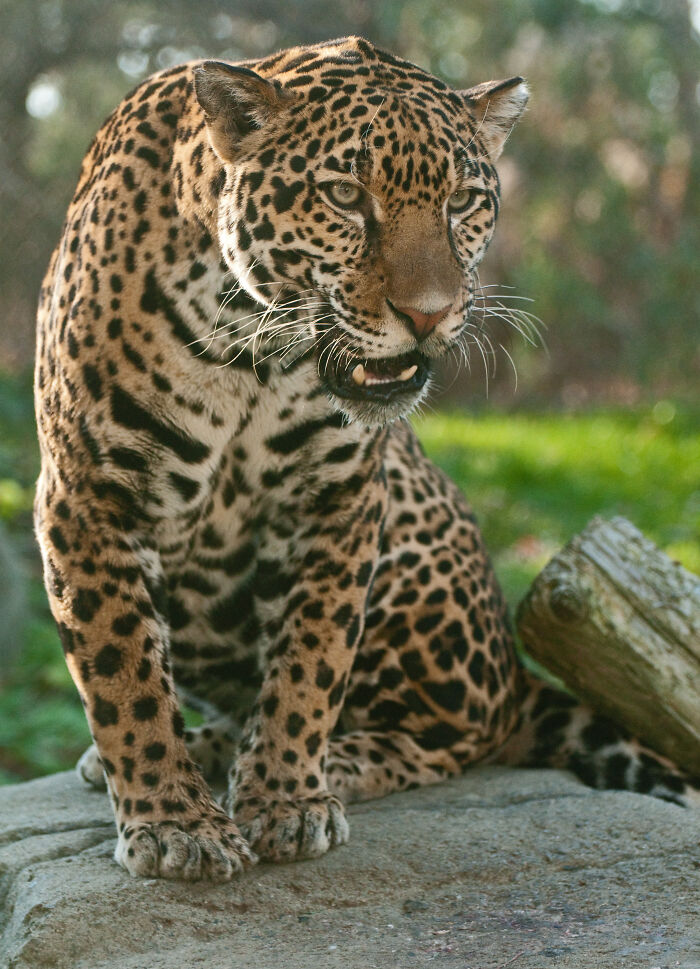
Image credits: Nytherion
#17
The dolphin trainers are stuck up. They are like the jocks in high school. They usually try to stay in shape because wetsuits aren’t flattering. They perform daily and people love them, so they have an ego.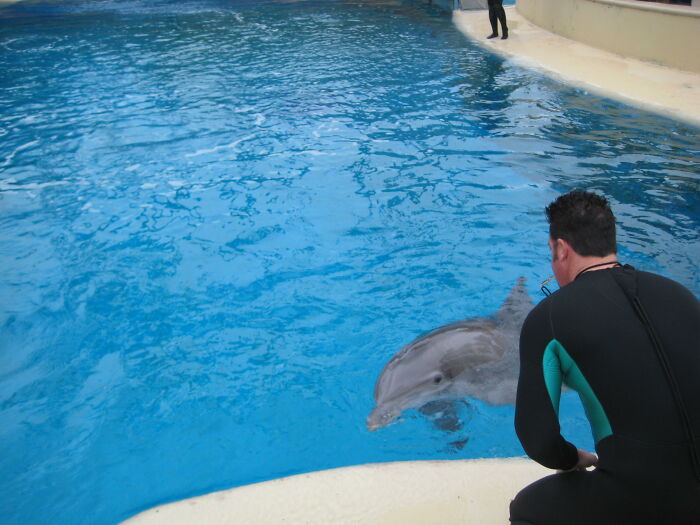
Image credits: LostInMyThots
#18
The path to being a keeper is rough. It can literally start with working a concession stand at a zoo with a college degree making minimum wage, and the path to mobility being talking to the other keepers to the point they'll let you clean the cage of the animals they keep. Do that a few years and hope that position opens, not necessarily one that you want, but any, because getting in the door is HARD, high demand, low supply. It is a job where you really need to love the work and be OK not making much money.Source: Friend followed this path at a zoo that is known the world over.
#19
There's no "dirty" secrets as far as shady practices or anything.But if you mean literally...oh yeah, it's dirty.
I cleaned up over 100 pounds of catsh*t just today, and even after I showered my husband still says I smell overwhelmingly of cat pee.
#20
Some people like to bring fruit and stuff to throw into the animals cages, even though they're not suppose to. If you're around and someone throws a pineapple into the gorilla or chimpanzee dens, gtfo. They will throw that thing full blast at someone. I saw a man get hit full force right in the side of the head and he was lights out. Pineapple exploded on impact. Paramedics came and everything.#21
Used to work at a zoo a few years ago. An elephant died while I was there and to transport the body out of it's enclosure they had to chop him up..RIP Toto
#22
If you have worked with them then you probably already know, but one swift kick from an ostrich can kill you. Like they will literally disembowel you. Every time I see a video of someone getting up close to one, I can’t help but cringe. One of our head keepers had actually lost part of their ear to one.#23
I volunteer at an aqurium and the people always ask about whether the sharks that are in with the fish ever eat the fish officially we say, “we keep them well fed enough that they don’t”, but on more then one morning on my initial walk around I have found remains of fish that definitely weren’t feed fish. On a particularly memorable occasion I found the head of a large porgy just sitting on the bottom. A diver went in and got it before guests arrived.#24
Not a zookeeper, but someone who has designed equipment and caging for zoos. I was told many horror stories how some animals would get hurt or even killed because of trying to find ways out of their caging. They can range from really stupid to incredibly brilliant.Had to replace a giraffe indoor pen. The previous one had vertical bars, think old jail cell bars. A bull giraffe stuck his head out then turned and went back in to the side to see what's behind him. He freaked out and essentially hung himself. So we couldn't use vertical bars that they could stick their head through.
Witnessed a silverback gorilla having a bad day. He seemed tired of the crowd and put a box on his head to make the world go away. People kept watching, he kept getting annoyed and finally threw the box off, charged us and pounded on the glass. I'm well aware that glass can take several shots from a .50 cal. rifle. But the explosive bang from the gorilla hitting the glass was insane, and terrified everyone.
Ostriches run on instinct primarily. I designed a cage for the vet. to treat them. It was entirely enclosed and had multiple small doors all around the cage. The reason is the vet told me about an instance where an ostrich got its foot cut and needed stitches. They got the bird in the cage and one vet fed bird and the other stitched up the cut. No anesthesia, just a diversion. The bird just kept eating and didn't care about getting the stitches.
In a different zoo they needed to replace the caging of a very large bird of prey. I don't remember the species, but I do remember seeing what it's claws did to the aluminum tubing cage they kept it in. The aluminum was shredded, and whoever was on the other side was either going to have a bad day or get what they deserved for pissing off this bird. I of course went with stainless steel heavy gauge rod for the cage. The shop hated all the welding but in the end the cage was way nicer and stronger than the old one.
I didn't get to travel much with the installation crew but I was in the shop supervising the building of caging. There were many times I had to have things rewelded or redone because of safety and Q.C. issues. Remember when you visit a zoo, that often times your life is depending on someone that wasn't qualified, underpaid, and overworked. Whenever I visit a zoo, I look at the structure design and how it was put together. Too many times I see welds that are of poor quality and barely hold the structure in place let alone stop something big and heavy that's pissed off..
#25
Aquarist of 10 years so I’m one of the people who reeks of fish all the time. Getting the smell of squid you’ve prepped off your hands is only possible with bleach.Artificial insemination of large sharks (for the purposes of developing procedures for vulnerable species) is as “interesting” as you might think. One day our vet used a broken popsicle stick as a speculum on a blacktip reef shark and every female aquarist at the procedure collectively shuddered. Squishing sperm out by squeezing the claspers is.... oof.
When I started as an intern my supervisor said we are glorified janitors. People don’t realize how technical being an aquarist is because we care for the system that keeps everything running and all of the filtration. I know how to plumb, drive a forklift, and am great with all sorts of random tools. Between cleaning the filtration that collects poop and scrubbing algae out of my exhibits, I really am a fancy janitor.
The things people seem to find most interesting are 1. Fish (including large sharks) have complex behaviors and can be trained. The goldfish memory thing is a myth. 2. We can anesthetize fish (including large sharks) and keep them alive out of water. We pump water with anesthesia in it into the mouth, and it then runs out over their gills allowing them to take up oxygen and the anesthesia. You can do this while they’re up on a procedure table that looks like a human surgery table, so you can do whatever surgery or procedure is necessary. We give veterinary care to even the tiniest of fishes and invertebrates... their welfare is excellent.
The nastiest (and saddest) thing I’ve seen is necropsies on wild rehab sea turtles when they either died in the wild or we weren’t able to save them. Going through the intestinal tract to look for impactions (usually plastic like balloons) is especially gross and there’s a smell that never leaves your nose. Do everything you can to reduce your use of plastic and vote for things that will help our planet.
The tough part of the job is the interpersonal aspect. Managers used to be aquarists, and aquarists are animal people- not people people. People skills don’t come naturally and neither does managing. Coworkers can also be judgemental and toxic. Pay also sucks, and the job is completely exhausting mentally and physically. It isn’t unusual for me to walk 5 miles a day on top of diving for hours and climbing 50 flights of stairs. Then there’s the mental aspect of always worrying about your animals or if you made a mistake that could hurt your animals. It’s not a job you turn off at the end of the day.
That being said, the job is amazing. I’m a coral specialist, and caring for coral is like being an awesome underwater gardener. Getting paid to go open ocean diving, and to go to conferences in cool cities to share knowledge with others is super amazing.
#26
Not a keeper but worked at an AZA zoo for 6 years, and was lucky to work with life science staff often. In the case of that zoo (and it isn’t unique):Keepers are required to have a bachelor’s degree and make poverty wages.
Treated like sh*t and paid like sh*t because there are always new, young graduates that want it as their dream job.
Pseudo-intellectualism is used to create a strict hierarchy between the majority of the keeping staff and the few in management and leadership. (How something may look for a paper or philanthropic effort takes precedent to actual animal welfare.)
There was an intense in-group culture to ingrain delusions of grandeur about sporadic, piecemeal wildlife conservation efforts being done.
The keeping staff mostly stayed sane by making truly deep relationships with the animals they care for. These animals are definitely loved and treated the best those individuals can (despite frequently terrible decisions and mandates from leadership).
#27
Coming in a little late but I was a zookeeper for roughly 6 years. The inside scoop that most guests don't realize how little most zookeepers are paid. It's an field that quite often suffers from the same fate teaching(at least in the US) share. Lots of highly motivated, passionate people who are willing to deal with low pay in order to do what they love. I can name quite a few of my past co-workers who have left just because they simply couldn't afford to live with such a low salary.#28
Former monkey keeper of around five years. I worked at a sanctuary for rescued animals or individuals that were not deemed valuable for breeding programmes (because of disability or overrepresented genes).You would assume people need lots of qualifications to work with exotic animals like monkeys. This is completely untrue. The most important thing is experience, and you can get that at some really sh*tty zoos.
It astonished me how little science and understanding went into the primates we cared for. Our lemurs had chronic diahorrea due to the unsuitable, high-sugar diets that they were fed. I made significant efforts to change this, but I don't think the keepers ever listened to me.
Escapes happen way more often than you think. One time our geriatric groundskeeper caught an escaped baby macaque in a net with what was a very lucky leap. Another time, visitors were fascinated to see our langurs sitting peacefully on top of one of our enclosures. They had made it out through a hole in the enclosure.
Visitors throw stones/rocks at the monkeys all the time. I would catch people once every couple of weeks.
Monkeys truly are vile. I love them but they are so gross. My favourite monkey was a rescued individual from Israel who was so prone to violent mood swings that he had to live by himself. Every morning he would wait until the keepers arrived to make his breakfast and he would sit at the wires having a wank. Often times he would try and get you to shake his hand, but usually he just ate his ejaculate.
#29
The big cats eat horse meat and the toads get fed 'pinkies' which are baby mice right after they are born.#30
Animals sometimes kill other animals and there really isn't much that can be done about it. I remember when a groundhog made it into a chimpanzee exhibit and the baby of the group found it. She caught it and played with it for a long time. Eventually, to keep it from running away, the baby beat it to death right beside the viewing windows. She then held it like a stuffed teddy bear for another half an hour, dragging it around with her when she went to forage. Mind you, this happened right in front of a group of school children. I was in the viewing area and a teacher/chaperone insisted that I "do something". Like, what? Ma'am, that's a chimpanzee; nobody's doing anything.The kids actually learned something on that trip to the zoo, though.
#31
This isn't a zoo I worked at but did visit often. Operators couldn't figure out why the sharks in the mixed species tank kept turning up dead so they set up a couple cameras and it turned out there was a f**king psycho octopus just killing for fun. Hiding between rocks, waiting, and then just strangling them to death.#32
I volunteered at a zoo for ~4 years. The otters ate absolutely anything they could get their paws on. In an open air exhibit that included a lot of birds and squirrels. The same is true for just about any carnivore/omnivore in an open air exhibit, it's just that the otters were particularly good at it.#33
I work three jobs to support my zookeeping habit, I've been in the game for about three and a half years now and it's a constant fight to keep my head above water. But I love it so much I don't think I can give it up.Most of my day is spent cleaning up animal sh*t. It's not glamorous. I have sustained a concussion and herniated discs in my spine from my work. I'm constantly covered in bruises and scrapes. I have so little vacation time that I see my family about once a year. I have to buy a lot of my work supplies and gear on my own dime. My benefits are so trash that the medication I need to survive is $220 a month with their insurance.
But I really, truly, honestly believe that I am doing good and worthwhile work, and I wouldn't trade anything for that moment during a training session where you see it dawn on an animal what you're asking for. My zoo is very conservation minded and avoids charismatic megafauna so that we can support smaller, lesser known mammals that don't get the same hype. I love it and I'm not giving it up.
#34
If you’re a guest feeding/touching animals outside of the petting zoo or an encounter, you might just kill them.I could rant about this forever. The number of zoo animals that die from incorrect food in their systems is staggering. The average person has no idea which animals can be killed from an apple core, a piece of bread, or a grape. Even just picking leaves and grass from outside of the enclosure. A guest has no idea what an animal’s digestive system cannot tolerate and can place a death sentence on an animal just because they wanted a special interaction.
Let’s talk about diseases! Our good pal rabies is a great one! Rabies vaccines are NOT produced specifically for every exotic animal species, so a vet will do the best they can by giving high risk animals the closest version of an appropriate rabies shot. The closest version does NOT guarantee no rabies! You tried to touch a monkey that is undoubtedly covered in saliva from grooming? Better go get your rabies shots! Not to mention the abundance of parasites and human foreign diseases that exotics can carry or we can pass on to them.
TLDR: If you feed or touch a zoo animal that you weren’t supposed to, you might kill it and should probably go to the doctor.
#35
Monkeys will, in fact, try to have sex with a female human if there is an opportunity to. The more you know.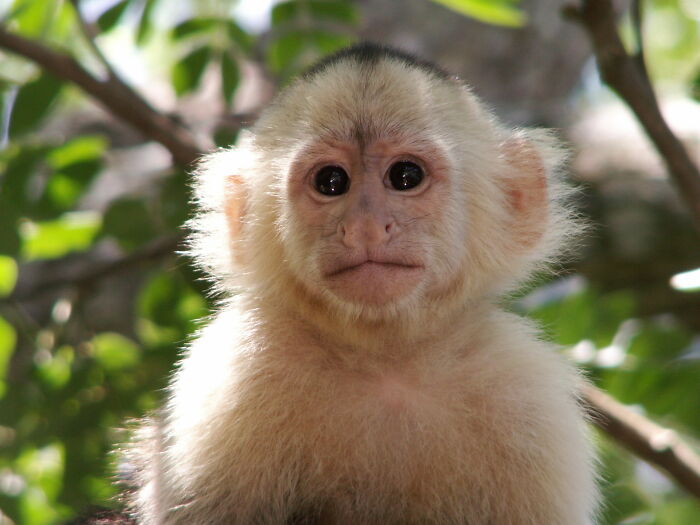
Image credits: yoboyjhonjhon
#36
The poor penguin keepers can never quite get rid of the miasma of dead fish that envelopes them. As for me, the stinkiest job I ever had to do was cleaning out the duck ponds. Managed to empty a whole train carriage that evening, even though I had changed and my work clothes were double-bagged.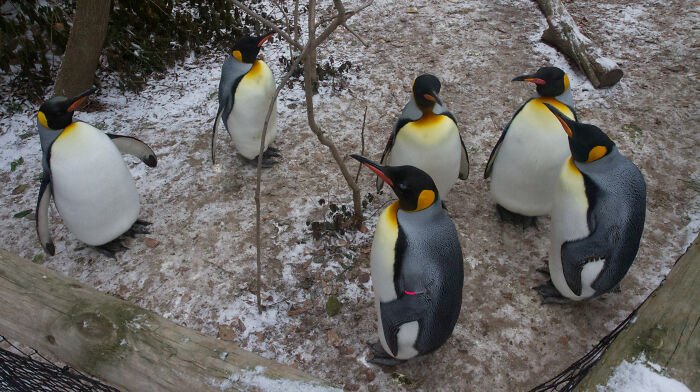
Image credits: ShadyElmm
#37
Because their external genitalia look similar, many spotted hyena populations in captivity are facing extinction due to groups being made of the same sex.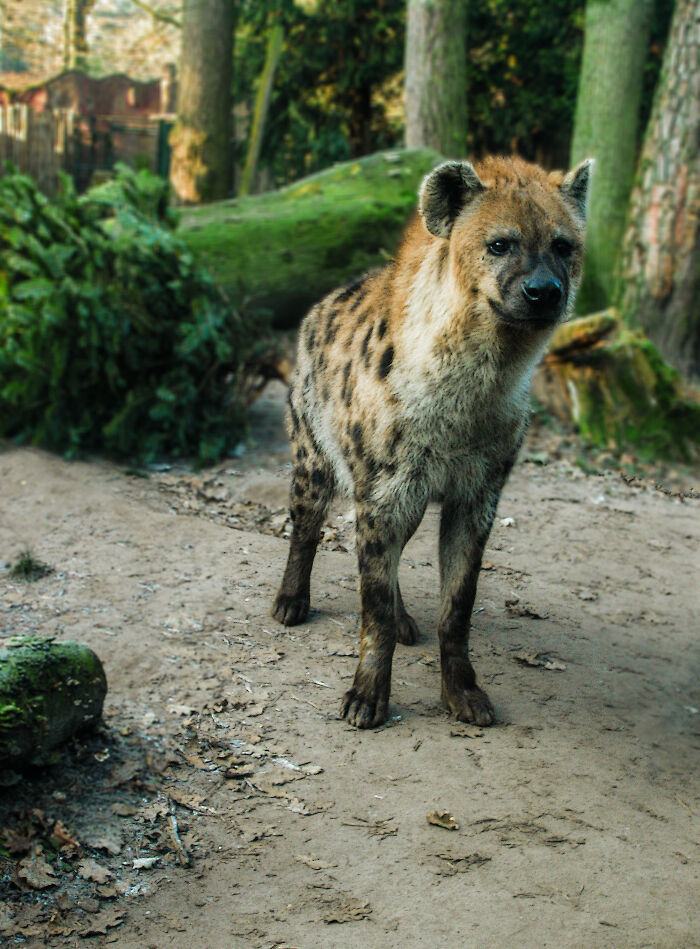
Image credits: JNC96
#38
The amount of injuries you can just casually pick up from animals is crazy. I've been kicked in the chest by a kangaroo, almost sexually assaulted by an emu, attacked by a wombat and a bat, bitten by a monitor lizard and a carpet python, had a rhino charge at me, and been scratched by a macaque. My old boss has this badass scar from a snow leopard attack, and this guy I work with now has his entire left forearm mangled from an orangutan attack.
Image credits: adamandatium
#39
Our camels will spit if you piss them off, and it's not saliva like most people think. You really, really, really, really don't want to upset our camels if you have any plans the rest of the week, please and thank you!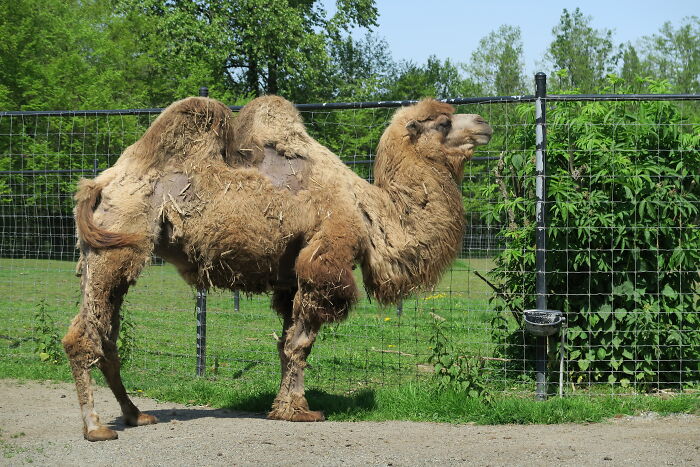
Image credits: leepingphal
#40
Lions know fully well that they can't get through the glass. They do that just to get attention.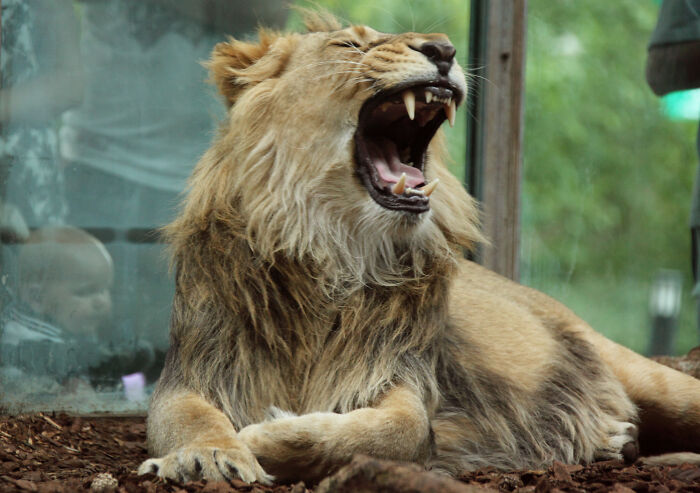
Image credits: WF6i
#41
Be careful walking by the open-air monkey enclosures, because poop isn't the only thing they'll fling at you. It's like that scene from Silence of the Lambs, when Clarice is going to see Hannibal Lecter...you know the scene I mean. Only much, much worse.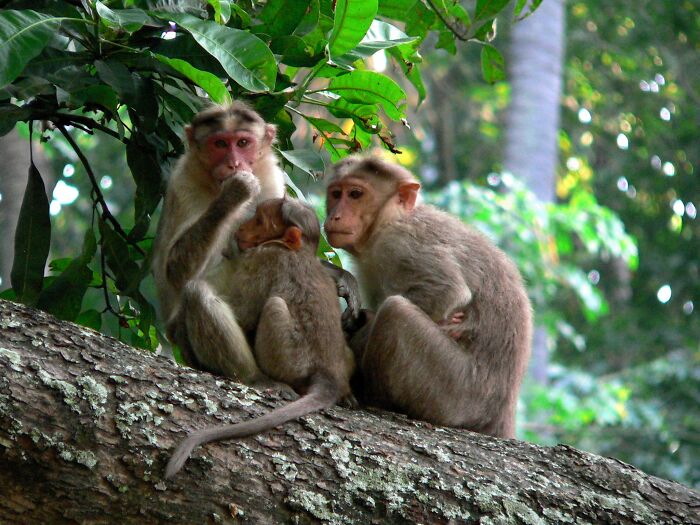
Image credits: Funkotastic
#42
I worked in the zoo's restaurant. The one thing that even low-level cashiers learned was the 'Mr. Wallaby' code. The manager on duty in each department carried a walkie-talkie, and if an animal ever escaped, the code to announce its location was 'Mr. Wallaby, please meet Mr. [Escaped Animal] at [animal's location].' I kinda hoped we'd have one with a small, harmless animal that would be easy to catch again, just to see the excitement. Making chicken salad sandwiches all day got a little monotonous.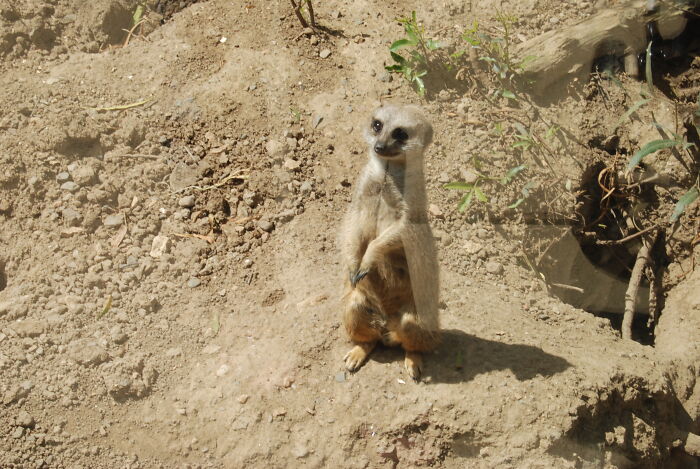
Image credits: RagingAardvark
#43
I used to volunteer weekly at a large zoo, and at one point, management started doing monthly dangerous animal escape drills. Someone would run around in a lion onesie and we’d have to react as if one of the large animals had escaped. It was hilarious, but one of the funniest things I was taught was that if an incident did occur, you have to tell the nearby guests to get inside only once. If, after that, they refuse to follow you indoors (the protocol was to hole up in the large activity center buildings), you’re to leave them there, go inside yourself, and lock the doors. It makes sense because people can be very stupid and you don’t want to risk everyone’s lives because of one Karen, but it amused me to no end that the protocol was to just let them get mauled.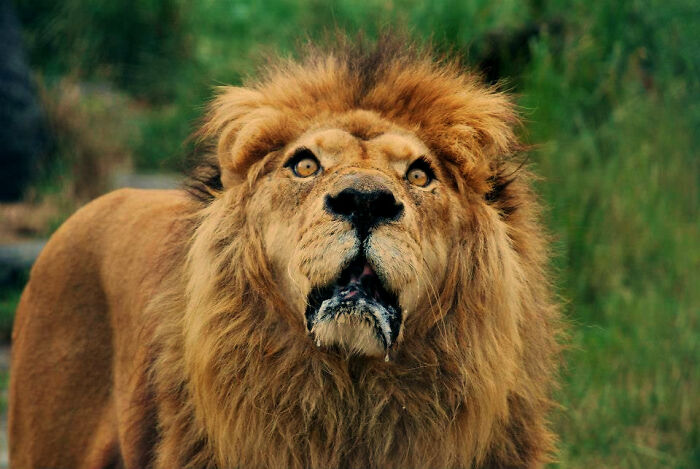
Image credits: thebourgeoisiee
#44
Went on a behind the scenes tour of the zoo.Saw quite a few bunnies come out during the tour (the neighboring park had a problem with people abandoning pet rabbits). It was pretty clear the dumb bunnies were getting into predator enclosures. Tour guide confirmed they were regularly getting eaten.
Tour guide also indicated other urban wildlife: raccoons, possums, squirrels, birds were regularly eaten by predators. Said that when they drained the lion enclosure moat for maintenance it was filled with the bones of small mammals.
The most amusing stories were about the orangutans who are wicked smart. Zookeeper trained them to give over items in exchange for food in case they needed to get something from them in the enclosure. But orangutans are smart, and realized if they break things up and hand it back in lots of little pieces they get more food. They disassembled a radio that accidentally got left in the enclosure and when there was an opossum in the enclosure the results were a bit more gruesome.
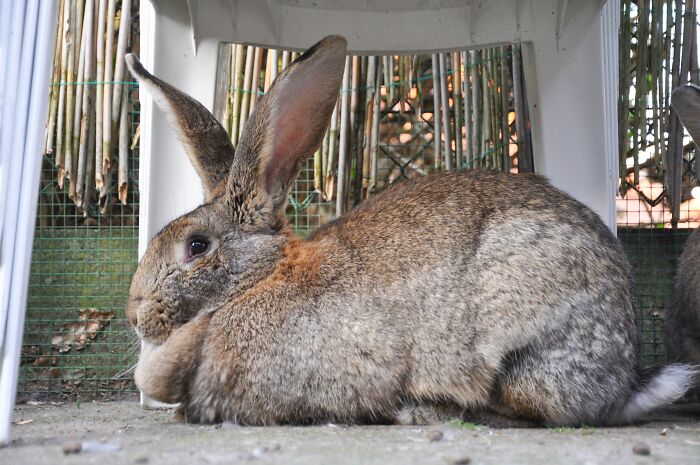
Image credits: 17top
#45
If you work with the animals there's a good chance you'll not be able to have any kind of social life, between the long hours/weekends and the stench.I've been kicked out of stores after work because I apparently stunk way worse than I thought I did - even after scrubbing off!
And I'm around animals every day, but I still can't stand when otter / sealion keepers are around me in "all-hands" meetings. The rotten fish + ferrety otter smell combo is a gagger. Meanwhile, I work with apes, and they say that I smell like I haven't showed in a decade (again...even after I shower)
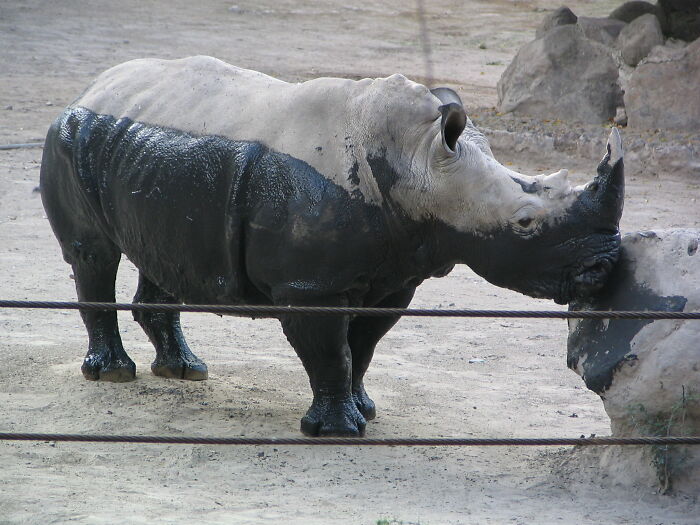
Image credits: bindobub
#46
Former coworker got a job at the aquarium. He was basically the night watchman, making sure nothing exploded when the aquarium was closed. The thing is, he can't actually do anything about it.A ray jumped out of the open touch pool, so he gently picked it up and set it back in the tank. No harm done, ray is fine. He got chewed the f*ck out for handling an animal. Policy is to call the expert handler for that department and have them come in, to avoid any liability and whatnot. By the time you get them to pick up the phone at 3 am, get up, and drive into the city it'll be like forty minutes at best. Assuming they came in at all.
So his job was really to just stand there staring as the animal suffocated.
He ended up quitting when he tried to call out sick because he had the flu so bad he literally couldn't stand up straight and part of the job was to walk the narrow hanging walkway over the largest tank in the world, which includes sharks, alone, at night... and they told him to come in anyway.
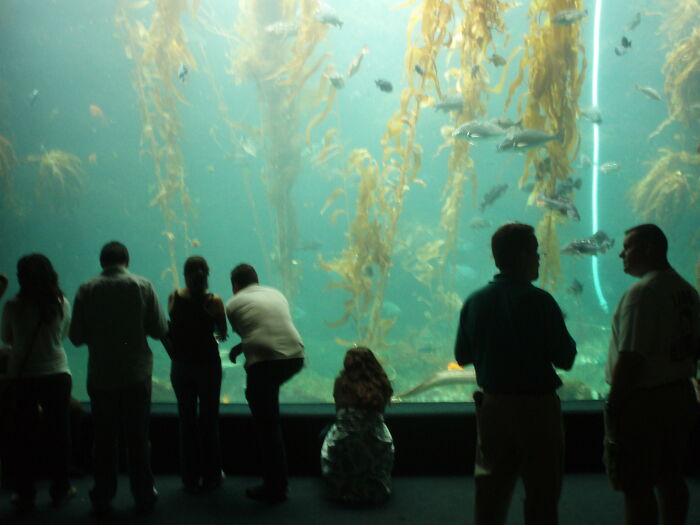
Image credits: RhynoD
#47
Partner was a zookeeper in Dallas. Safety protocols for when a large, dangerous animal escapes its enclosure dictate that you lock yourself in whatever room you can get to quickest and grab the nearest weapon, which, for most zookeepers, was a broom or rake for cleaning up animal poop.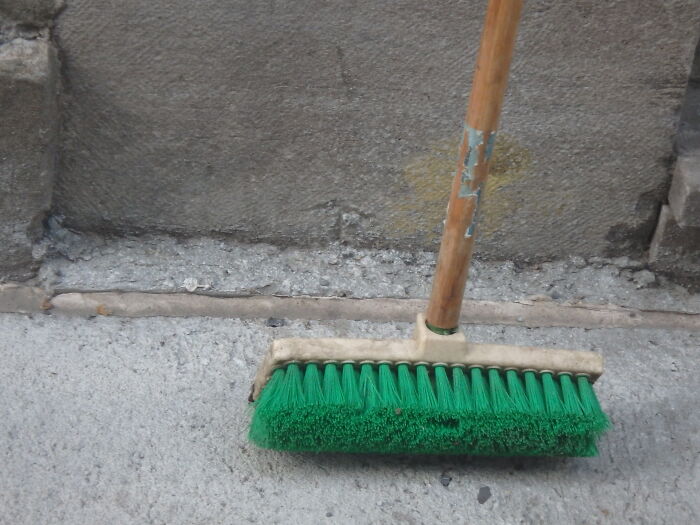
Image credits: musical_hog
#48
I spoke to a zoo keeper at the national zoon in DC. We where watching another keeper inside the cheetah enclosure and I asked him about the danger involved. He said a cheetah is harmless to an adult human because it only hunts smaller creatures. I asked which creature was the worst to go in with, expecting hippo, elephant or croc as an answer. Without hesitating he said "zebras" then leaned close and whispered "They are the biggest assh*les. They will bite and kick for no reason." I still think it's hilarious that off all the teeth and claws out there, it's stripped donkey horses that are the worst.#49
The bird sanctuary has a bird hospital attached to it full of sick dying birds and smells like Satan's anus.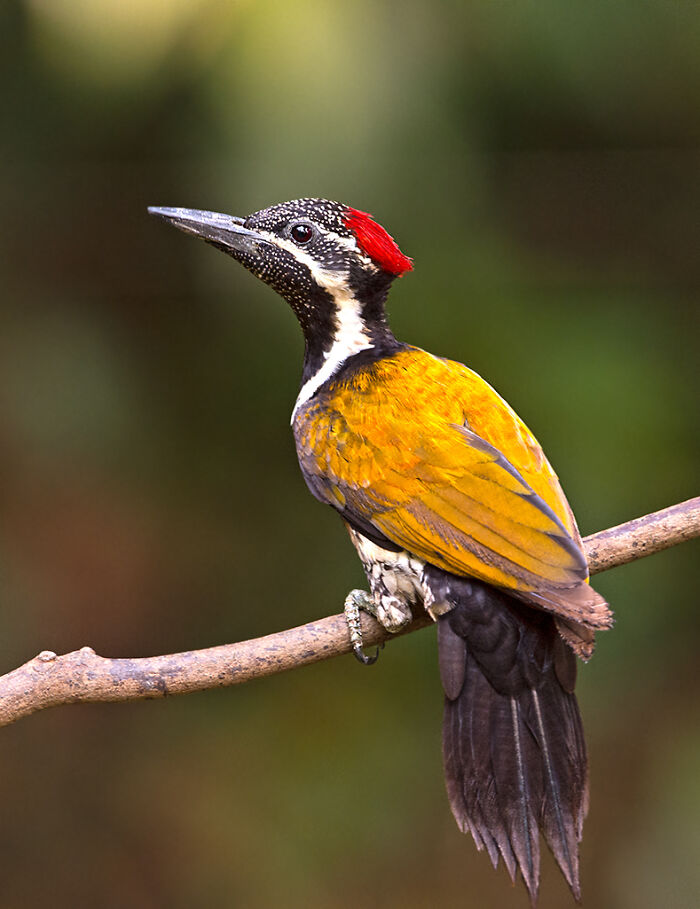
Image credits: groverwood
#50
My mom worked at a zoo when I was a kid and there were some things that were kept under wraps. For one, a hyena escaped once and they had to track it down. Also, a pack of dogs got into the zoo and killed most of the wallabies.The worst story was that a group of teenagers broke in in the 80s and pulled the legs off of the flamingos. That one always really bothered me.
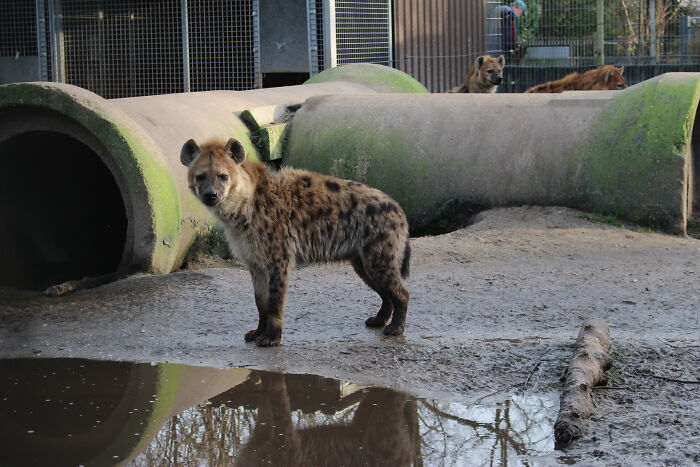
Image credits: jlanger23
#51
I worked in two completely different departments (elephants and neonates), but the drama between keepers was insane in both. Like, attempted murder level insane.#52
Not a zookeeper, but worked at one for a long time. We had a tram tour that drove over a bridge where there were a bunch of crocodiles below. If someone were to fall out of the tram at this point, the protocol was to speed out of the area as fast as possible so the remaining visitors on the tram would not see the unfortunate person get teared to shreds by the crocs#53
Hippos use their tail to fling their poop everywhere.Stay out of their splash zone.
#54
I worked an extra job at a major big city zoo in it concessions area. I had a golf cart to get around delivering supplies and maintaining equipment in the various concessions stands. The best part was that I could go where the public couldn’t go and petting the rhino’s faces and horns in the rear of their enclosures at a hugely strong steel fence was the highlight of my weekend. Dirt? I do recall that about three or four months after the concessions company started selling a well known named frozen yogurt I was standing with the concessions manager and his assistant when I heard the assistant make an off handed observation “Man, this yogurt is selling like crazy!” and then the manager replied “You’re right... let’s raise the prices.”#55
So, my best friend is a zookeeper (birdkeeper?) at a zoo that has a renowned aviary. He has told me that most birds are just constantly horny and are never gentle. If you wear anything bright, they WILL try to f*ck any appendage that gets near them. They're also smart enough to be vindictive about it. And not just males; he has a mortal feud with a female hornbill for similar reasons.His stories are great.
#56
I volunteered at a zoo a few summers ago. I worked in the bird house. The job mostly consisted of chopping fruit, filling bowls with live meal worms, and cleaning. Oh my god so much cleaning.Captive penguins have trouble swallowing on their own, so you have to kindof shove fish down their throat. Oh and the more social ones will hump your leg. It involves a lot of wing flapping.
Some of the cutest parrots are the most evil. There were a few nasties, likely because they pair bonded to a singular person or bird long ago and are now separated.
There's a bird at that zoo with clipped wings that occasionally sits on a perch outside, without a real cage. He's not going anywhere from there, but he sleeps in the indoor enclosure. When being trained on how to feed him, I was told not to fall for the sweet "I love you!" spiel. He goes for the eyes. I would use my hand as bait under the cage so he would move away from the door, then quickly swap out his food plate before he realized my other hand was actually in reach.
Brand new baby birds are both cute and horrifying to behold.
They had Keas, which are an incredibly smart species of large parrot. We'd give them boxes full of fruit that they would have to take apart a certain way to get in, and they loved it. I heard they've been known to occasionally ruin people's engines for fun in New Zealand, but that could be a rumor.
It was a great summer.
#57
Management can make a huge difference to a zoo, but it’s incredibly hard to convince anyone you have a bad manager.Take Steve Burns for example. He was hired over a decade and a half ago to be the business side manager of Zoo Boise’s Nonprofit wing. At the time the zoo decided to merge that position with the head of Animal Care so despite having no actual animal knowledge Steve became the Director of Zoo Boise. He then went on a long tirade of making the zoo more and more like a business, promoting people who are going to do whatever he wants and not ever question him, cutting down the budgets as much as possible, and engaging in business practices that would help him but ultimately harm the zoo. If he didn’t like you he would find a reason for you to be fired as quickly as possible. Once, despite being elected to the head of the AZA (elective governing body of zoos) board at the time he rushed construction on an exhibit so it could be grandfathered in to meeting requirements he knew were coming down the pipe from AZA that would mean his new exhibit wouldn’t qualify as quality for that animal. He gave an inordinate amount of the zoo’s budget to conservation, which is great for conservation, but Zoo Boise at the time was at a critical moment for the zoo where it was expanding and needed more staffing, better exhibits, and better animal care budgets and all those were limited for his giving. After he directly contributed to the death of a major animal at the zoo with his policies he got a job directing at the Hogle Zoo.
At Hogle he did everything in his power to make it like he left Zoo Boise, cutting budgets for staff education and training, getting rid of programs designed to help staff in their future careers, increasing volunteers so that staff would be deemed “unnecessary” (he once said he thought the whole zoo could be run by volunteers). When the coronavirus happened he used it as an excuse to cut any and all staff that would stand in his way, including decades of experienced keepers.
At the end of last year he finally left the zoo world to focus only on Conservation Work, which is good because that’s pretty much the only thing he was good at when it came to zoos. Sad that in his wake he left two steaming ravaged carcasses of Zoos that now are struggling to be what they once were or could be if Steve Burns never touched them.
That’s why when people ask about my job I always say ALMOST everyone at the zoo is there to make the animals’ lives as good as possible.
Edit: I forgot to say that despite everything he did managing institutions at both zoos and donors all LOVED him, even when his staff was actively petitioning for anyone to care about what Steve was doing.
#58
The baby chicks you see in the zoo farm are food for the reptiles and other animals. There are also animals that were raised by humans that never rehab but this isn’t told patrons so they don’t continue to interact with the animals as pets. There’s a behind the scenes chimp and gorilla enclosure with apes that won’t ever rehab. There is a female chimp that is the most aggressive and she absolutely hates men. She was tortured by catchers who cut off her arm. She is too dangerous to keep with other chimps so she has lived in solitary confinement for over a decade now and won’t ever live like the other apes in captivity.#59
Zookeepers can only stand to hang out with zookeepers of the same kind of animal because of the smell. No matter how much you scrub or change, the smell clings. Primate keepers smell like they haven't bathed in a decade, snake keepers smell cloyingly unnerving, and sealion people make you gag from the fish smell.#60
Pretty tame, but 10 years ago I worked in the restaurant of a Zoo. And we sold this "Homemade African Soup" in this themed restaurant but in reality it was chinese vegetable soup from a bag.Also from the employee lunch room we could see the inside of the giraffe enclosure that guests could not see. There were several tally's being held. Ranging from : Zookeeper slipping in poo to amount of giraffe erections.
#61
In high school I worked at the Jacksonville Zoo, just doing super basic stuff. We had an exhibit of river otters and one morning the staff noticed there was an extra otter. Not a baby, an extra adult otter. They looked through the security cameras and found that a wild river otter was making his way from the nearby St.Johns river and getting into the exhibit to play with the other otters. Because of the risk of disease transmission we couldn’t allow the wild otter to keep doing that so they reinforced the exhibit to keep it out. It took like 5 attempts for them to finally make a wild otter-proof exhibit. It was an ongoing problem for like a year.#62
Flamingos are territorial assh*les. Whenever I cleaned their enclosures I would have to go in with an umbrella to scare them away to prevent them from attacking me#63
Zoo work is like a lot of not for profit work. You do it for the love not the money. Love doesn’t pay the bills so not everyone lata long. The ones that do are usually a little kooky.#64
If you have to choose between cleaning the poop from a flamingo enclosure or an elephant enclosure, choose the elephants. The flamingos were by far the smelliest exhibit, and elephant poop is heavy but comparatively odorless.#65
I work with dolphins, these creatures are sexual as f*ck. We have 2 smaller boys together and they’ve been seen stimulating each other. Our 3 female dolphins have freshwater hoses that lead into the pool to play with, they flip themselves upside down, lay on the surface, and let the water do its thing. We also have another male dolphin separate from the others that likes to show his d*ck to families, pretty funny to watch tbh. Dolphins are weird.#66
Late to the party, but I wanted to mention all the older animals. Sometimes people don't realize there are older critters who have health issues. A lot of older fish we had were kept in the back tanks away from view because people assumed normal old fish issues were a result of poor husbandry and would get upset if they were on display. Imagine having your 17 year old incontinent dog in a zoo, people would think it looks emaciated and pathetic.Along the same lines, zoos have improved significantly in terms of animal husbandry over the years, but a lot of older animals have been in zoos since before these changes occured. I remember working with a group of chimps and one of the old chimps would masturbate while staring at me as I cleaned the outside of the enclosure. I had to remember this guy joined the zoo at a time when they would dress chimps up in kids clothes and make them have tea parties and s*it. He had some mental issues that weren't his fault. Thankfully that troop has gotten better housing and care and has now started acting more normally, even reproducing with their own troop members and acting like real apes should.
#67
I had to draft the zoo's contingency plan for all sorts of emergencies. Flood, tornado, extreme heat, war or attacks, you name it. The plan included a prioritized list of which animals in the collection we would have to sacrifice to feed to the other animals in extreme situations. I literally created a zoo food chain. Humans were left off the list entirely.#68
Not a zookeeper, but my two next door neighbors are. One of them told me all animals have to get an autopsy immediately post-mortem, and her team has the luxury of not having an external team to do so. She has to cut open the animals she so tenderly loves and cares for immediately after they die without time to grieve and see all their viscera - even if the cause of death is already known, since they want to check for any other issues such as parasites, cancer, genetic problems, etc. Worst part is she also takes care of some rather larger animals like antelopes, giraffes, and cheetahs - so you can imagine both the attachment over the years and the horrid reality of excavating every crevice of a dead giraffe.She still loves her job very much, but struggles with this. Her partner works with primates and they have their own autopsy team so he gets to avoid carving up his babies, but she's had to learn to dissociate emotionally to get through the tougher moments.
#69
What do you want to really know?Zookeepers are overworked, underpaid, and are constantly in a battle to prove their worth to seemingly everyone. We spend day and night (and sometimes overnight) caring for our animals often regardless of our personal lives because those animals deserve the best life possible and at the end of the day the most abused thing at the zoo is the Zookeepers themselves.
I had a guest tell me one day that they thought the gorilla would be happier dead in the wild than in his habitat while also knowing absolutely nothing about what is impacting gorillas in the wild. I’ve had parents point at me cleaning a habitat and tell their children “stay in school or you’ll end up like her”. In fact I’d say a decent percentage of guests in my 10+ years were extremely surprised to hear most Zookeepers have degrees/higher education.
Zoos need our support at the end of the day as they provide education and experience that can build empathy. We have to teach people to care and it’s hard to when sometimes things aren’t affecting the immediate world around us but is instead affecting someone else’s across the globe. Why is it important to recycle your old cell phones? It will reduce the need to mine for coltan, a mineral used in cell phones that can be recaptured in the recycling process. Less coltan mining = less loss of habitat for gorillas among other animals. Do you check the labels of items you buy for sustainable Palm oil? If not, you could be helping add to the destruction of orangutan habitat. Our actions matter, our choices matter, and we have to teach that.
#70
The amount of dumbasses who complain to management about paying to go to the zoo then not seeing any animals is unreal! Like, what do you want us to do? Go in there with sticks and chase them out of their hidey-holes?! Sorry buddy, not going to happen.#71
Ok, as is tradition, not a full zookeeper buuut...When I was a teenager in the 90s, I did volunteer work at the Oakland zoo. There weren't many of us, so we got to choose where we helped out, so I chose to work with Bhakti, the 32ish year old Bengal Tiger. Nearly oldest living in captivity when he finally passed. I chose him because he was beautiful, and he always seemed lonely.
He had pacing syndrome hardcore, so his entire paddock was green and lush except for the paths along the outer fence line and one or two diagonals he used to get into and out of his night cage. The keepers did their best with him, but had clearly written him off. He was grumpy, unsocial, hid from the public, swiped and hissed at keepers, and ignored all of the enrichment toys and food put out to keep him mobile.
They had a few young Siberians in quarantine already waiting to be put on display, they just had to wait for him to pass and the stubborn old cat lived to spite them.
He always started the morning by pacing his fence line, so I started pacing with him. No eye contact, no sounds, just walking back and forth for an hour or two.
After a couple weeks, he started chuffing at me when I arrived, so I learned how to mimic it to say hi back.
Another month, and he would actually break his pacing circuit to walk with me, jogging his ancient arthritic ass from wherever he was across the green sections to match me.
Poor guy just needed a friend. I still get a bit misty eyed thinking about him. Just a lonely old cat who had to spend the last years of his life basically alone.
Don't get me wrong though, the keepers really did do their best, but they couldn't spend all day with him like I could. They had many duties and creatures to care for and he had a really steep barrier to entry as a friend.
As grumpy as he was, I still think he was good people.
#72
I did co-op at one for two weeks. The Sumatran tigers had a nice enclosure but the overnight enclosure was very small and depressing. I would walk around the outdoor enclosure hiding meatballs while they were in there, and I was always scared someone would forget I'm out there. There's nothing like that smell of tiger urine, as soon as I first smelled it it's like an instinct kicked in and all the hairs on my body raised as if I just knew there was something close that could kill me.Also, so many people drop money beneath the walkways, I found a few $5.00 bills.
#73
I'm a small animal vet now but worked in a zoo before vet school. Zoos are one of the biggest purchasers of Calvin Klein's Obsession cologne. The cologne has animal musk in it and it drives the big cats wild. We used to spray it on everything.#74
The job is 24/7. Even where you're not working, you're still working. And it's like 90% cleaning poop, pee and food leftovers/food containers and buildings. And answering some very dumb question such as "Is the cheetah right there the youngster of a lion?". That kind of question truly make you understand how dumb people can be and how much they need to be educated about wildlife.If you're working with small primates, you will be peed on at least once in your career; birds can show love in a quite painful way (but you still love them because they are way smarter and amazing than most people know) and you always watch you back (and never turn it to some species).
Btw, the skin between an hippopotamus' nostrils is super smooth under the hand (but yeah, don't pet them for no reason xD).
And sometimes, you will just have to stand in front of an enclosure for hours in order to monitor your animal's behavior (they like to give this job to trainees/interns).
from Bored Panda https://bit.ly/3xEkJOW
via Boredpanda
